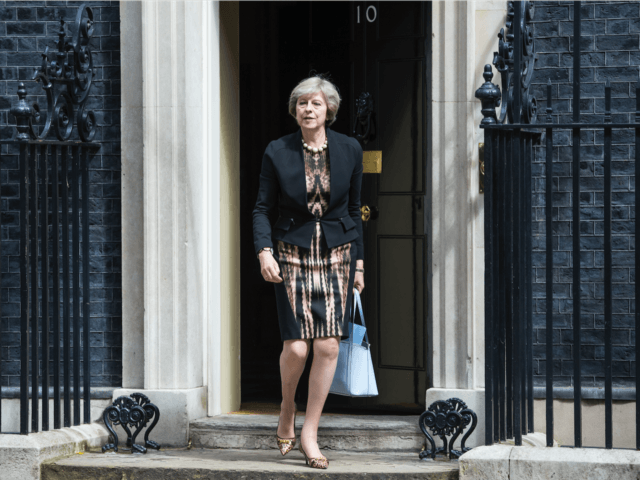London (AFP) – Britain’s Interior Minister Theresa May emerged as the clear frontrunner Tuesday as lawmakers started picking a new prime minister, while shockwaves from the Brexit vote hit the property market and sent the pound plunging.
May, who wanted Britain to stay in the EU but now says she will lead it out, scooped up 165 votes from ruling Conservative Party lawmakers.
Unfancied pro-Brexit junior energy minister Andrea Leadsom was her nearest rival with 66 votes, followed by eurosceptic justice secretary Michael Gove on 48.
“There is a big job before us: to unite our party and the country, to negotiate the best possible deal as we leave the EU, and to make Britain work for everyone,” May said following the vote.
“I am the only candidate capable of delivering these three things.”
Two candidates bumped out of the race, Liam Fox and Stephen Crabb, threw their support behind May.
European leaders are putting Britain under intense pressure to move fast on triggering the process known as Article 50 and there has been economic turmoil since last month’s referendum vote to leave the EU left Britain in uncharted waters.
But May, who pitches herself as a pragmatic safe pair of hands capable of unifying the split Tories, says she will not start the formal departure process until the end of the year at the earliest.
The Bank of England warned Tuesday that risks to financial stability from Brexit were starting to “crystallise” and reduced the size of buffer it requires commercial banks to hold in a bid to boost lending.
Meanwhile, the pound fell to a new 31-year low against the dollar and three commercial property funds suspended trading, citing uncertainty since the referendum.
“Dominoes are starting to fall” in Britain’s lucrative commercial property market, said Laith Khalaf, senior analyst at investment company Hargreaves Lansdown.
– Brexit’s ‘sad heroes’ –
Britain on June 23 voted by 52 percent to 48 percent in favour of leaving the bloc, the first member state ever to do so.
The result has thrown the whole European project into question and threatens the United Kingdom’s own unity since pro-EU Scotland is now raising the prospect of independence.
While May campaigned for Britain to stay in the EU, she now says that “Brexit means Brexit” and has ruled out an early election or a second referendum — both seen as possible ways of rowing back from the result.
Leadsom, who campaigned for Britain to leave, wants exit negotiations to be “as short as possible” in order to avoid “prolonged uncertainty”.
There is set to be a further ballot on Thursday before the names of the final two leading contenders will then be put to 150,000 Conservative party members and the result will be declared on September 9.
The referendum vote has shaken Britain’s political order, plunging both the Conservatives and the opposition Labour party — whose leader Jeremy Corbyn is facing a drawn out rebellion by his MPs — into chaos.
Leading Brexit campaigner, MEP Nigel Farage, resigned as head of the UK Independence Party on Monday, saying his “political ambition has been achieved” while former London mayor Boris Johnson, a main figure in the campaign to leave the EU, pulled out of the Tory leadership race.
“The Brexit heroes of yesterday are now the sad heroes of today,” European Commission president Jean-Claude Juncker told the European Parliament.
“Patriots don’t resign when things get difficult, they stay.”
– Iraq report spells trouble –
The Brexit vote has sparked a fierce debate in Brussels on whether the EU should close ranks and press for more union or opt for a looser grouping.
Hungary’s eurosceptic government on Tuesday announced a referendum on a troubled EU migrant quota plan.
Austria’s finance minister Joerg Schelling said he did not think Britain would ever quit the EU, telling Handelsblatt newspaper that EU leaders were discussing “all possibilities”.
In the face of EU pressure for a swift exit and a legal challenge backed by British business leaders, the minister overseeing Britain’s new Brexit civil service unit said Tuesday that Article 50 could be triggered without a parliamentary vote.
But Oliver Letwin admitted that the issue could end up in court and said parliament would eventually have to either repeal or amend the 1972 European Communities Act, the legal basis for Britain’s EU membership.
Labour leader Corbyn is still clinging to his job, despite being roundly defeated in a non-binding no-confidence vote of Labour lawmakers angry at his lacklustre campaigning to stay in the EU.
Corbyn argues that support from grassroots members, who delivered him a landslide victory in last year’s leadership election, gives him a mandate to lead.
Wednesday’s release of a long-awaited report into Britain’s involvement in the 2003 Iraq invasion is likely to pour oil on Labour’s fire, pitching socialist Corbyn, who opposed it, against centrist MPs who supported then Labour prime minister Tony Blair’s decision to join the US-led military action.

COMMENTS
Please let us know if you're having issues with commenting.